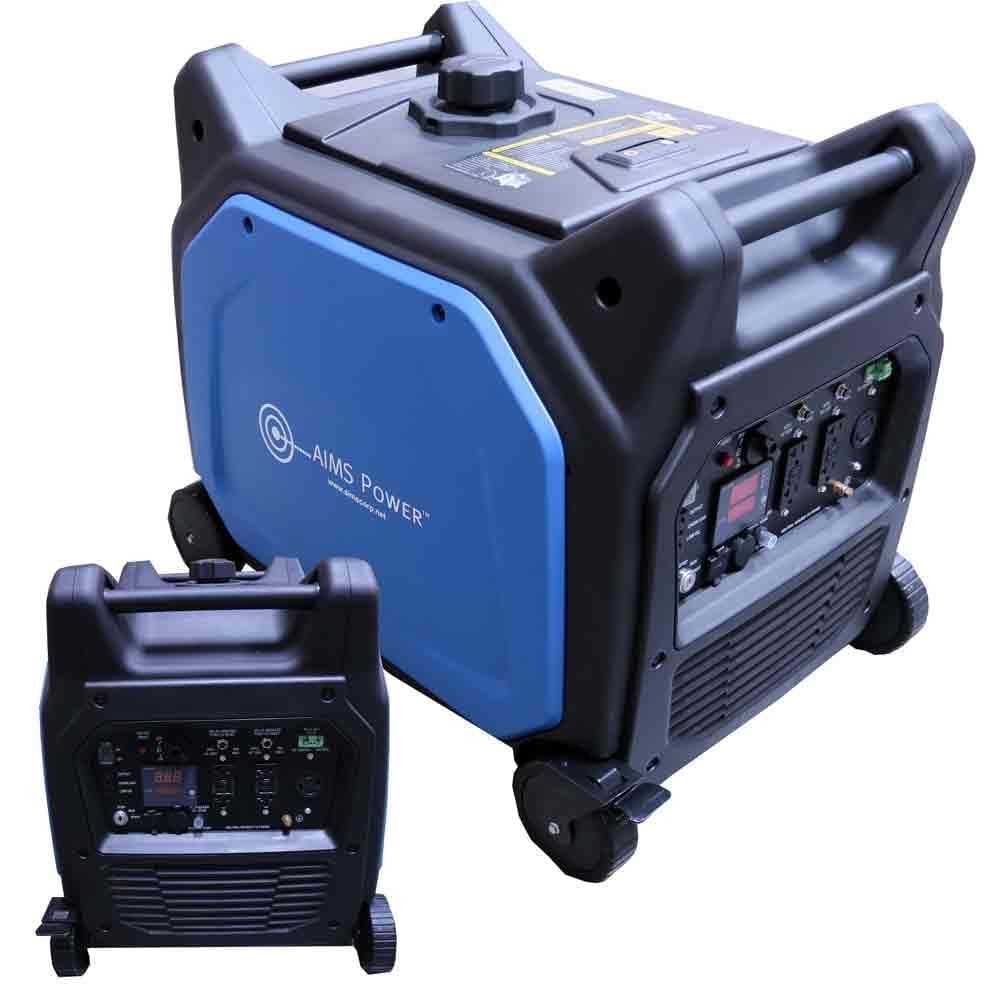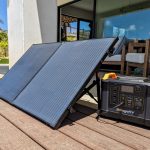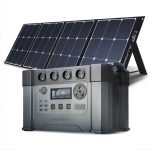A gas solar generator is a type of generator that is powered both by gas and solar energy. It is a great option for those who need a reliable source of power but don’t have access to traditional electricity. The main advantage of a gas solar generator is that it is much more reliable than a traditional gas generator, as it can draw energy from both sources. This means that in the case of a power outage, the generator can still provide power. The downside to the gas solar generator is that it is more expensive than a traditional gas generator.
This may be a factor to consider when deciding which type of generator is best for you. Another factor to consider is maintenance. As with any type of generator, regular maintenance is important for the longevity of the product. A gas solar generator will require more maintenance than a traditional gas generator, so this is something to consider. Overall, both gas and solar generators can provide reliable power. What type is best for you depends on the specific needs for your situation. Gas solar generators are more expensive but can provide reliable power in the event of a power outage. However, you may need to consider the cost of regular maintenance when deciding if this type of generator is best for you.
Can you run a house on a solar generator?
This type of generator is becoming increasingly popular due to its energy efficiency and low cost of installation. Using a gas solar generator to power your home is a great way to reduce your carbon footprint and save money on energy bills. Solar energy is abundant and free, so it makes sense to take advantage of this unlimited resource. Not only will you be able to save money, but you can also rest easy knowing that you are using a safer and more sustainable way to power your home. Gas solar generators are incredibly reliable and require little maintenance, making them a great choice for home owners.
With a gas solar generator, you can run your home without relying on the traditional power grid. The generator is capable of providing enough energy to power your home appliances, such as lights, washing machines, and refrigerators. You can even use the generator to power your air conditioning or heating system. In conclusion, a gas solar generator is a great way to power your home and reduce your energy costs. With the right setup, you can easily run your home on solar energy and enjoy the benefits of a clean and reliable power source.
How many years will a solar generator last?
With proper maintenance and regular check-ups, it can provide reliable power for up to 15 or 20 years. Most of these generators come with a warranty of up to 10 years or more. However, the true longevity of a solar generator will depend on the quality of the components used, the environment it is in, and the amount of use it receives. When properly installed and maintained, it can easily last for 20 years or more. In addition, a gas solar generator will also require some additional maintenance to keep it running optimally.
This includes regular cleaning and inspection of the components. It may also require occasional replacement of batteries, inverters, and other components if they become damaged due to use or wear and tear. Overall, a gas solar generator is a reliable and cost-effective way to generate renewable energy. With proper maintenance and care, it can last for up to 20 years or more. It is an excellent way to reduce your energy bills and make your home run more efficiently.
Which is better generator or solar power?
Gas solar generators offer a great alternative to traditional generators and solar power. They are a hybrid of the two and provide a powerful, reliable source of energy. Gas solar generators combine the convenience of gas generators with the clean, renewable energy of solar power. By using solar panels to capture the sun’s energy, the generator can produce electricity while consuming less fuel. This makes them ideal for off-grid applications.
In terms of energy efficiency, gas solar generators are much more efficient than traditional generators. They reduce emissions by up to 90%, and they require less fuel to run than traditional generators. When it comes to price, gas solar generators are generally more expensive than traditional generators. However, the long-term savings they offer make up for the initial cost. Over time, they can pay for themselves by generating free energy from the sun. Overall, gas solar generators offer a great way to save energy and money over the long-term. They provide a reliable source of clean energy and are cost-effective in the long run. In terms of which is better, gas solar generators offer a strong advantage over traditional generators and solar power.
Can you run a solar generator continuously?
The primary benefit of a gas solar generator is that it can run continuously without the need to refuel or recharge. This makes it easier to maintain and use than traditional sources of energy. Additionally, using solar energy to power the generator doesn’t produce any harmful emissions, making it a great choice for those looking for a more sustainable energy source. A gas solar generator is also a great choice if you want to run it continuously. It is able to store and convert the solar energy into electricity, making it possible to generate an uninterrupted supply of power.
This makes it ideal for powering homes, businesses or other large-scale operations. Overall, a gas solar generator is an excellent choice for those looking for an eco-friendly and efficient way to generate power. With the ability to run continuously, it’s a great option for those who need a reliable and cost-effective energy source.
How many hours will a solar generator last?
A gas solar generator can last for a varying amount of hours depending on the size and power of the generator. Generally, a gas solar generator can provide up to 40 to 50 hours of power on a full tank. The amount of energy produced depends on the amount of solar energy available which can differ depending on the season and location. The size and capacity of the generator is also a factor, with larger generators providing more power, but also consuming more fuel. When using a gas solar generator, it is important to ensure that the generator is well maintained.
Regularly check the fuel levels, oil levels, and other components to ensure that the generator is in good working condition. This will ensure that it works optimally and provides the highest amount of efficiency, as well as extend its life. Overall, a gas solar generator can last for a number of hours depending on its size, the amount of solar energy available, and the maintenance of the generator. With proper care and maintenance, a gas solar generator can provide reliable power for many years.
What are the disadvantages of solar generators?
Gas solar generators are an efficient and cost-effective way to generate energy from the sun. However, they may not be the right option for everyone. Here are some potential disadvantages to consider before investing in a gas solar generator. First, gas solar generators require a significant upfront investment. This cost can be difficult to recoup, especially for those who only need a small amount of energy.
Second, gas solar generators are not as efficient as other types of solar energy systems. This means that you may need to spend more money on additional solar panels or other components to generate enough energy. Third, gas solar generators may not be suitable for all locations. Depending on your climate, the amount of sun exposure you get may not be enough to generate enough energy to power your home. Fourth, gas solar generators produce higher levels of emissions than other renewable energy sources, such as wind or hydro power. This means that they may not be the most eco-friendly choice. Finally, gas solar generators require regular maintenance and may need to be replaced after a few years. This additional cost may not be worth the hassle or expense for some people.
What are the 2 major drawbacks to solar power?
The first major drawback of using a solar powered gas generator is that it is expensive to buy and install. Furthermore, solar panels require large amounts of space to collect enough sunlight to be effective. This makes it difficult to install them in many residential and commercial locations. Another major issue is that solar power is dependent on sunlight. Without enough sunlight, the generator will not be able to produce enough electricity to power the required devices.
This means that if you live in an area that experiences long stretches of overcast weather, solar power may not be the best option for you. Finally, solar power can be unreliable. Even with direct sunlight, the amount of electricity that a solar powered gas generator can produce varies significantly depending on the season, time of day and cloud cover. This makes it difficult to predict the amount of energy that can be produced on a given day. Overall, solar power has two major drawbacks: it is expensive to set up, and it is unreliable. However, this doesn’t mean that it isn’t a viable option for some people, especially those living in sunny locations.
Which is better solar or gas?
When it comes to gas-solar generators, the choice between solar or gas is often a tough one. Solar power is a renewable resource that is clean and efficient, but can be expensive to install and maintain. On the other hand, gas power is more economical and can provide a steady supply of energy. In terms of suitability, solar is ideal for areas with a lot of sunlight, while gas is suitable for locations with low levels of sunlight or cloudy days. Solar may be more expensive to set up, but it can provide a more reliable source of energy than gas.
When it comes to environmental impact, solar is a much better choice. It doesn’t produce any emissions that could harm the environment or contribute to global warming. Gas generators, on the other hand, produce carbon dioxide and can be a source of air pollution. When it comes to cost, solar is generally more expensive than gas in terms of installation and maintenance. However, over the long term, solar can be more cost-effective as it requires no fuel and has no ongoing operational costs. Overall, both solar and gas have their pros and cons and the best choice will depend on individual circumstances. If you want a reliable and cost-effective source of energy, gas may be the right option, while if you want a clean and renewable source of power, solar is the way to go.
Is there a gas and solar-powered generator?
This type of generator is able to produce electricity using both natural gas and solar energy, giving you the power you need without relying on just one source. The advantages of a gas and solar-powered generator are many. Firstly, they are more efficient than traditional gas-powered generators, as they use both sources of energy to produce electricity. This means that you can get more power for less fuel. Secondly, these generators can run for longer periods of time, as the solar energy can be used to recharge the gas and solar-powered generator.
In addition, a gas and solar-powered generator is more environmentally friendly than a traditional generator. These generators produce fewer emissions and pollutants, as the solar energy helps to reduce the amount of fuel burned. Finally, gas and solar-powered generators are often less expensive than traditional generators. The cost of installing and maintaining a solar energy system may be higher initially, but the long-term cost savings can be substantial. Overall, a gas and solar-powered generator is a great choice for anyone looking for an efficient, environmentally friendly and cost-effective way to generate electricity. It provides the best of both worlds, providing reliable power while reducing emissions and saving you money on fuel.
Can a solar generator power a whole house?
It harnesses the energy of the sun to generate electricity, which can be used to power a variety of electrical appliances in your home. The amount of power a gas solar generator can provide depends on the size of the generator and the number of solar panels used. A larger generator with more solar panels will be able to generate more electricity and power more of your home. In general, a gas solar generator can power a wide variety of electrical appliances in your home, including lighting, air conditioning, refrigerators, and more. However, it may not be able to power the entire home, depending on how much energy it can generate.
When deciding if a gas solar generator can be used to power your entire house, consider the size of your home, the number of appliances you need to power, and the amount of energy your generator can generate. If you need more energy than the generator can provide, you may need to supplement your solar power with other sources. Overall, a gas solar generator can be a great way to power your home. With the right setup, you can use it to power a variety of appliances and reduce your reliance on traditional energy sources.
Can solar and generator combine?
Gas solar generators are an excellent way to power your home or office, allowing you to reduce your carbon footprint and save on energy bills. But can solar and generator combine effectively? The answer is yes! Solar and generator can be combined in a variety of ways, making them an excellent choice for those looking to reduce their energy costs and rely on a more efficient and sustainable energy source. Using a solar panel to generate electricity from the sun and using a generator to store the electricity for later use is a great way for homes and businesses to become more energy self-sufficient. Solar energy is free and renewable, making it a great choice for those who want to save money and reduce their carbon footprint. Combining a solar generator with a back-up generator can provide a reliable and efficient source of power, that can be used to power your home or business during times of peak load or when solar power is not available.
This is especially important during emergency situations, when access to the grid may be unavailable or limited. In addition to providing a reliable source of power, solar and generator combinations can be used to reduce your energy bills. By combining solar and generator, you can also generate more electricity than you use, selling the surplus energy back to the grid for an additional income. Overall, combining solar and generator can be a great way to reduce energy costs and become more energy self-sufficient. Whether you are looking for an emergency back-up or use it as a main source of energy, solar and generator can be a great choice for those looking to become more sustainable.
Can a solar generator run a refrigerator?
A gas solar generator can be used to power a refrigerator. This is because the gas solar generator can convert sunlight into electricity, which can be used to power the refrigerator. The solar generator is able to store the energy from the sun and use it when it is needed. This means that the refrigerator can be run even when there is no sunlight. The solar electricity produced by the generator is clean, renewable energy, and it is very efficient in powering a refrigerator.
It also has the added benefit of reducing the amount of money spent on electricity bills, since the generator will produce its own electricity. The solar generator also has the benefit of being able to work in remote and off-grid locations, where traditional electricity is not available. This means that even in remote areas, people can still have access to refrigeration. Overall, a gas solar generator is a great choice for running a refrigerator. It is an efficient and cost-effective way to generate electricity and power the refrigerator, and it can be used in remote locations where traditional electricity is not available.
Do solar generators work in winter?
Gas solar generators are an efficient and cost-effective way to generate energy, particularly in warmer climates. But do they work just as well in winter? The short answer is yes, solar generators can work in winter, but there are a few things to consider. Firstly, obviously the amount of sunlight available is lower in winter than in summer, so you may need to make some adjustments to your system. In particular, you will need to consider the angle and orientation of your solar panels to maximise the amount of sun they receive. Additionally, you will need to ensure that your solar panels are not blocked by snow or ice, as this can reduce their efficiency.
It is also important to take care of your solar panels and keep them clean to ensure that they are working to their full capacity. Finally, a gas solar generator will need to be insulated during the winter months to prevent it from freezing. You should also regularly check the battery for any signs of damage or wear and tear, as this can affect your generator’s performance. In short, a gas solar generator can work well in winter, but it is important to ensure that you take the necessary precautions to ensure that your system is working to its full potential. With the right care and maintenance, a gas solar generator can provide you with reliable energy all year round.
Can a solar generator run a gas furnace?
It works by using solar panels to collect and store energy from the sun which is then converted into electricity, and this electricity can be used to power most standard gas furnaces. The advantages of using a gas solar generator are numerous. Firstly, it reduces a household’s dependence on traditional electricity sources, as the energy produced is completely renewable and does not require the burning of fossil fuels. Additionally, it can significantly reduce electricity bills and reduce environmental emissions. However, there are some limitations to be aware of when it comes to running a gas furnace with a gas solar generator.
Firstly, the size of the generator and the amount of energy it can produce will determine how much energy it can provide to the furnace. Additionally, the efficiency of the generator will also have an impact on the amount of energy that can be used by the furnace. Additionally, the cost of a gas solar generator can be quite high, as the upfront cost of the equipment and installation can be expensive. Furthermore, the maintenance costs of the generator can also be quite high. In conclusion, it is possible to run a gas furnace with a gas solar generator, however, the size of the generator and the cost of the equipment and maintenance should be taken into consideration. Additionally, it is important to consider the efficiency of the generator when determining how much energy it can provide to the furnace.
Can a gas generator charge solar batteries?
This type of generator is a great option for those who don’t have access to reliable electricity, or who would like to save money on electricity costs. One popular use of a gas solar generator is to charge solar batteries. This process is relatively simple and can help to store solar energy for later use. To charge solar batteries, the generator uses its gas-powered engine to transform the fuel into electricity, which is then used to charge the batteries. The gas solar generator is an ideal option for charging solar batteries, as it is a reliable and cost-effective power source.
As the generator takes a variety of fuels, it is easy to keep the generator and batteries running in any weather condition. Additionally, the generator can also be used to power other electrical or mechanical equipment, making it a great all-in-one solution. Overall, a gas solar generator can be used to charge solar batteries, making it a great choice for those who need a reliable and cost-effective energy source. The generator is easy to use and can be used in any kind of weather, making it a convenient and efficient way to store solar energy.
What happens to solar power when batteries are full?
When using a gas solar generator to generate solar power, it is important to understand what happens when the batteries are full. When the batteries become full, the solar generator will automatically disconnect the solar power from the batteries, preventing further charging and protecting the battery from potential damage. In order to keep the generator running, the excess solar power will be diverted to another electricity source, such as an inverter, or stored in a separate battery for future use. This helps to ensure that the solar power is always put to use instead of being wasted. When the solar generator is not in use, or when the batteries are full, the solar power is generally either stored in a battery or sold back to the electricity grid.
This helps to increase the overall efficiency of the solar generator, as well as provide an additional source of income to the users. The amount of solar power stored or sold back to the grid will vary depending on the available storage capacity and the weather conditions. In order to maximize the efficiency of the generator, users should be sure to check the batteries and the solar conditions regularly to determine when it is best to store or sell back the solar power. Overall, when batteries are full, the solar power produced by the gas solar generator will be disconnected from the batteries and either stored in a separate battery, sold back to the electricity grid, or diverted to another electricity source. This ensures that the solar power is put to good use and helps the user to maximize the efficiency of the generator.
Can a solar generator power a house?
It harnesses the power of the sun, which is free and abundant, and converts it into electricity. By using a gas engine to supplement the solar components, a gas solar generator is able to produce a reliable and steady supply of power. This generator can provide enough electricity to power a house, depending on the size and energy needs of the household. It is important to note that, while the generator can power a home, it is unlikely to be able to provide enough electricity to run major appliances such as air conditioners or ovens. When using a gas solar generator for your home, it is important to ensure that the system is properly maintained.
The generator should be regularly serviced, and all components should be checked for damage or deterioration. In addition, it is important to use quality solar panels and other components, as these will increase the efficiency and longevity of the system. To maximize the efficiency of a gas solar generator, it is also important to properly position the solar panels. The panels should be placed in an area that receives direct sunlight for most of the day, and they should be tilted in order to capture the most sunlight. This will ensure that the generator is able to produce the most electricity possible. Overall, a gas solar generator is a great way to power a house with renewable energy. With proper maintenance and setup, it can provide a reliable and steady supply of electricity.
Should you buy a solar generator?
They are powered by solar energy, meaning they don’t rely on the traditional fuel sources like oil and natural gas. As a result, they are much more efficient and environmentally friendly. If you are looking for a reliable and renewable energy source, buying a gas solar generator is an excellent choice. Not only do they provide clean and reliable electricity, they can also save you money in the long run. They require no maintenance and can be used in almost any location, regardless of the climate.
The first benefit of a gas solar generator is that it is portable and easy to use. All you need to do is plug it into a wall outlet, and you’ll have instant access to electricity. Furthermore, it is small and light enough to be moved around easily. Another great benefit of having a gas solar generator is that it is cost-effective. You won’t need to pay for expensive fuel sources and there are no long-term contracts or monthly bills to worry about. Furthermore, since it is powered by renewable energy, you can rest assured that you are helping to reduce your carbon footprint. Overall, if you are looking for a reliable and renewable energy source, buying a gas solar generator is a great choice. Not only do they provide clean and reliable electricity, they are also cost-effective and require no maintenance. They are also portable, making them the perfect choice for anyone looking to take their energy source with them.
Do solar generators really work?
It works by converting sunlight into electricity with the help of photovoltaic cells. This electricity can then be used to run lights, appliances, and other electrical devices. Do solar generators really work? The answer is yes, they do work. Solar energy is a renewable energy source and it is becoming increasingly popular as an alternative to grid-supplied electricity. A solar generator can provide enough power to run essential household appliances, such as lighting, fans, and refrigerators.
Gas solar generators are easy to install and maintain. They are designed to be low-cost, efficient, and reliable. Additionally, they have a long lifespan and require very little maintenance in order to keep working. Although gas solar generators do work, they may not be a good option for everyone. They require direct sunlight to produce electricity, so they may not be suitable for areas with long winter months or frequent cloud cover. Overall, solar generators are a great option for those looking to reduce their carbon footprint and save money on electricity bills. They are reliable, efficient, and cost-effective. They are a great way to generate electricity without relying on the grid.
How much does a solar generator cost?
Gas solar generators are an increasingly popular way of generating electricity for homes, businesses and other operations. They are powered by the sun’s energy, meaning they are both sustainable and cost effective. So, how much does a gas solar generator cost? A typical gas solar generator ranges from $500 to $4000, depending on the power output, type and quality of the product. The more powerful the generator, the more expensive it will be. The installation cost of a gas solar generator also varies, depending on the complexity of the system and the size of the property.
Installation costs range from $500 to $10,000. So, it is important to get several quotes to compare the costs of installation. In addition to the cost of the generator and the installation, there are also the ongoing costs of maintenance and operation. Regular maintenance of the system is necessary to ensure its efficient and reliable operation. In conclusion, the cost of a gas solar generator varies depending on the size and power output of the system, as well as the complexity of the installation. It is important to compare quotes to get the best value for money. The ongoing costs of maintaining and operating the system should also be factored in when making a decision.
What is the best battery for a solar generator?
Gas solar generators are becoming increasingly popular, due to their ability to provide clean energy to a variety of different applications. When choosing the best battery for a gas solar generator, it is important to consider the type of application, the size of the battery, and its power output. Lead-acid batteries are generally the best choice for long-term storage of energy in a gas solar generator, as they are both durable and relatively inexpensive. They are also relatively easy to maintain and do not require a lot of energy for charging. However, if you are looking for a battery with a higher energy density, lithium-ion batteries are the best choice.
These batteries are much more efficient than lead-acid batteries and can provide more power at a much higher rate. They are also much lighter than lead-acid batteries, making them easier to transport. In addition to the battery type, it is also important to consider the size of the battery. A battery with a larger capacity is ideal for applications that require more power, while a smaller battery is better suited for applications that require less power. Finally, when choosing the best battery for a gas solar generator, it is important to consider the power output of the battery. Batteries with higher wattage will provide more power, while lower wattage batteries will provide lower power. It is important to choose the battery with the appropriate power output for the desired application.
Can you use gas generator to charge solar generator?
The gas generator is used to generate electricity, while the solar generator uses sunlight to generate power. The gas generator can be used to charge the solar generator, allowing the solar generator to produce more power. This is beneficial, as it allows the solar generator to produce more electricity, even when the sunlight is not available. The gas generator can also be used to supplement the solar generator, providing additional power when the solar generator is not able to produce enough power. This can help to keep your solar generator running when it is not able to generate enough electricity on its own.
In order to use the gas generator to charge the solar generator, you will need to ensure that the gas generator is properly connected to the solar generator. This will ensure that the two devices are able to communicate with each other, and that the correct amount of power can be transferred between them. Once the gas generator is connected to the solar generator, it can be used to charge the solar generator. The amount of time it takes to charge the solar generator will depend on the size of the solar generator and the capacity of the gas generator. If the gas generator has enough capacity, it can charge the solar generator quickly.
Can you run a refrigerator off a solar generator?
With a solar generator, you can store energy from the sun and use it to power your refrigerator whenever you need it. Not only will you be able to keep your food fresh and reduce food waste, but you’ll also save on electricity bills and reduce your environmental impact. A gas solar generator is a great option if you’re looking for a reliable and efficient way to power a refrigerator. Since the sun is a free and renewable source of energy, you won’t have to worry about running out of power or dealing with unreliable electricity sources. Furthermore, gas-powered solar generators are usually portable, so you can take them with you wherever you go.
When it comes to powering your refrigerator with a gas solar generator, there are a few things you should consider. First, you’ll need to make sure your refrigerator is compatible with the generator you’re using. You’ll also need to determine the size of the generator you need in order to power your refrigerator. Additionally, you’ll need to choose a generator that is capable of producing enough power to run your refrigerator efficiently and reliably. Overall, running a refrigerator off a gas solar generator is a great way to save money and reduce your environmental impact. With a little research and the right equipment, you can enjoy the convenience of a refrigerator powered by the sun.






